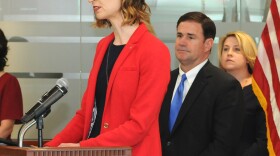By Howard Fischer
Capitol Media Services
PHOENIX -- Senate Republicans are moving to approve new restrictions on the ability of county recorders to conduct voter registration drives.
The measure by Sen. Michelle Ugenti-Rita, R-Scottsdale, limits such sign-ups to government buildings. She said this takes politics out of the equation by precluding recorders from picking and choosing where to set up shop based on which group they hope to get registered.
But Sen. Martin Quezada, D-Glendale, said he sees something a bit more sinister -- and perhaps hidden -- in SB 1358.
"We didn't want to point out exactly which communities are being more focused on than others,'' he said. And Quezada said he thinks he knows why.
"County recorders are most likely to go to communities that are underrepresented in terms of their voter registration numbers,'' he said. That, he said, makes sense.
What's not said, Quezada continued, is who that is.
"Those communities tend to be black and brown, and they tend to be poor,'' he said.
"And if that's the problem, we're dealing with a whole different issue here,'' Quezada said. "And I think that's very troubling.''
Ugenti-Rita, for her part, insists her legislation is neutral.
"Would I want my county recorder only going to gun rallies?'' she asked rhetorically.
"No, just like I don't want him going to pro-life or pro-choice rallies or things where you know you have a high chance of speaking to, again, a certain segment of the population to the exclusion of others.''
But she separately acknowledged to Capitol Media Services that there is a political component behind the measure.
Ugenti-Rita cited figures from the Maricopa County Recorders Office between January 2017 and July 2019, at the time under the direction of Democrat Adrian Fontes.
She said his voter-outreach program went to 56 "explicitly Democrat Party events and only six explicitly Republican Party events.''
"Remember, this is a taxpayer funded office, using tax dollars to exclude two thirds of the voters and only want to speak to the Democrats,'' referring to the fact that about a third of registered voters are Republican, a third are independent and a third are Democrats.
Fontes is now gone, having been defeated in November by Republican Stephen Richer. An aide said Richer was not taking a position on the legislation.
But Fontes, now the deputy recorder in Pima County, had some thoughts of his own.
"Michelle Ugenti is using me to go after her real enemy: Arizona's voters,'' he told Capitol Media Services. And Fontes said if there's a political disparity between the work his registrars did, there's a reason for that.
"I spent as much time reaching out to Republican organizations and legislative district (organizations) as I did Democratic organizations and LDs, and was very often refused by the Republicans,'' he said.
The only one to speak against the measure was Jenn Marson, executive director of the Arizona Association of Counties. She said if there is a problem -- and she is not saying there is -- it would be better addressed with legislation prohibiting recorders from political discrimination in their choice of where to register voters.
What's wrong with this, Marson said, is it precludes recorders from going to all sort of other public events to sign up voters solely because they are not located on government property.
Ugenti-Rita said that's not an issue. She said there are other groups that register voters, ranging from the political parties themselves to other civic groups.
"So you're not the only one in this game,'' Ugenti-Rita said. And she said her bill would not preclude other organizations with specific political points of view from having voter-registration drives and telling people about their agendas.
Marson, however, said that doesn't recognize the reality of some situations. Consider, she said a long-term care facility wanting to ease the registration process for residents.
"They're not going to reach out to the League of Women Voters or pick any other third-party group,'' Marson said. "They're going to call their county government, their county recorder, and say, 'I've got these people that need to register to vote, can you come over here and get them registered because they can't leave this building.' ''
Ugenti-Rita remained unconvinced.
"You don't know that,'' she said.
"I don't know that the senior centers would not be open to engaging other groups and organizations that do this if they were to find out the county recorder could no longer offer that kind of service,'' Ugenti-Rita said. "That's an assumption.''
Gabriella Cazares-Kelly, the newly elected Pima County recorder, told Capitol Media Services the measure, if it becomes law, would severely limit voter registration outreach and place "yet another barrier between the potential voter and the registration process.''
"We are especially concerned with not only or rural and tribal communities in Pima County, who often lack physical government offices in their regions, but even in underserved communities in Tucson,'' Cazares-Kelly said.
"If we want more people to participate in our most fundamental rights as American citizens, we have to engage more with the the public,'' she said. "And that means getting out from behind a desk and going to where the people are.''
Sen. Jamescita Peshlakai, D-Window Rock, said lawmakers should be looking for ways to make it easier to register to vote, not erecting new hurdles. She said that is particularly true with the COVID-19 pandemic still flaring in the state.
"It's going to continue to affect people's ability to do all kinds of ordinary things, including registering to vote,'' Peshlakai said.
On a more practical level, she said nothing in the measure says whether it would remain acceptable for a county recorder to set up a voter-registration drive on tribal lands on reservations. Instead, the wording restricts registration to locations, facilities or property "that is government owned.''
The 5-3 party-line vote in the Republican-dominated Senate Government Committee on Monday sends the measure to the full Senate.





